#EHR vs EMR
Explore tagged Tumblr posts
Text
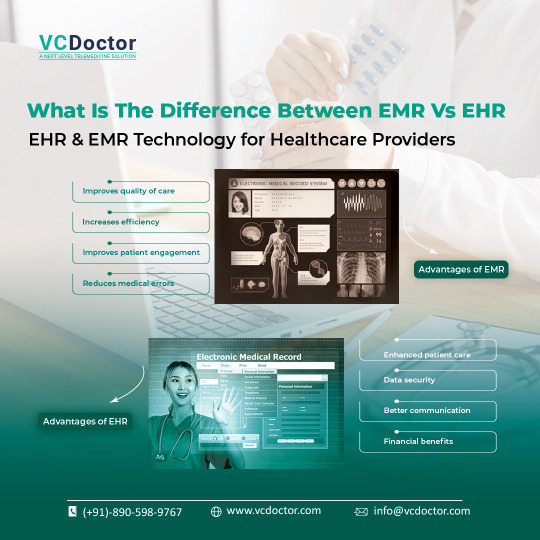
The healthcare industry has experienced a revolution in recent years, especially after the covid-19. Since the healthcare industry is digitalized, Telemedicine software and health records are essential tools for doctors and health specialists. The global electronic health records market is expected to reach a valuation of over $40 billion by the end of 2024. At times, the terms “EHR and EMR” are used interchangeably. However, both are different from one another. Understanding the difference between EHR and EMR is vital for patients, healthcare providers, and specialists. If you’re eager to know how EMR vs EHR, you’ve landed on the right page.
0 notes
Text
0 notes
Text
EMR vs EHR: What is the difference?
There are plenty of acronyms that are in use inside the healthcare industry. EHR and EMR are two standard terms that can be used alternatively. When it comes to a debate on EMR vs EHR, both are pretty similar; however, they have different meanings. Furthermore, EMR is an acronym for ‘Electronic Medical Records,’ while EHR is an acronym for ‘Electronic Health Records’. EHRs have a deeper and broader scope in comparison to an EMR.

0 notes
Text
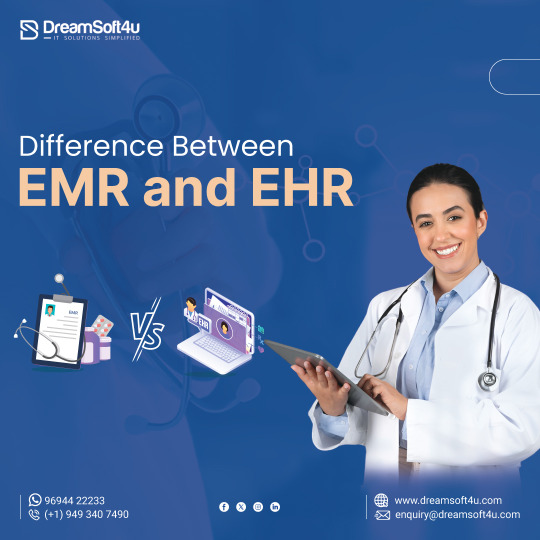
The healthcare industry has adopted technology widely and taken steps towards digital transformation. However, in order to make a complete digital shift, healthcare needs to streamline their data management. Although healthcare is one of the biggest sectors with huge amounts of data. It has to be secured and easily accessible. This is where two technological advancements, i.e., EMR vs EHR, play major roles.
#ehr software#emr software#emr system#emr vs ehr#ehr integration#benefits of ehr#emr integration#ehr benefits#benefits of emr#emr benefits
0 notes
Text
Cracking the Code: EMR vs EHR - Everything You Need to Know for Efficient Patient Data Management
In the healthcare industry, the terms EMR (Electronic Medical Records) and EHR (Electronic Health Records) are often used interchangeably, leading to confusion. However, understanding the distinction between the two is crucial for healthcare professionals and patients alike. This post aims to provide a comprehensive overview of the differences EMR vs EHR, their respective functionalities, and their impact on healthcare delivery.
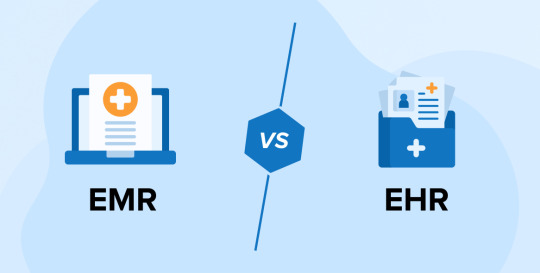
What is EMR and its key features?
EMR, or Electronic Medical Records, refers to digital versions of paper charts in a clinician's office. They contain the medical and treatment history of patients in one practice. EMRs typically include medical and treatment history, diagnoses, medications, treatment plans, immunization dates, allergies, radiology images, and laboratory test results.
What are the key features of EHR?
EHRs, or Electronic Health Records, are designed to be shared across different healthcare settings, enabling a more comprehensive view of a patient's medical history. EHRs go beyond the data collected in the provider’s office and include a more comprehensive patient history. They can be created, managed, and consulted by authorized providers and staff from across more than one healthcare organization.
How do EMR and EHR differ in terms of interoperability?
Interoperability is a critical factor in the differentiation between EMR and EHR. EMRs are not designed to be shared outside the individual practice. EHRs, on the other hand, are built to be shared with other healthcare providers, such as laboratories, specialists, medical imaging facilities, pharmacies, emergency facilities, and school and workplace clinics, so they contain information from all clinicians involved in a patient's care.
What role do EMR and EHR play in patient engagement?
Understanding the role of EMR and EHR in patient engagement is essential for healthcare professionals and patients. EMR, or Electronic Medical Records, serve as digital versions of paper charts within a clinician's office, containing a patient's medical and treatment history in one practice. On the other hand, EHRs, or Electronic Health Records, are designed to be shared across different healthcare settings, providing a more comprehensive view of a patient's medical history. This interoperability allows for a more holistic approach to patient care, enabling authorized providers and staff from multiple healthcare organizations to access and contribute to a patient's records, ultimately enhancing patient engagement and healthcare delivery.
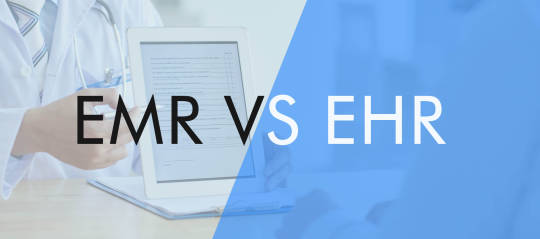
What are the key benefits of using EMR and EHR?
The key benefits of using EMR and EHR is essential for healthcare professionals seeking to optimize patient care and streamline administrative processes. EMRs, or Electronic Medical Records, offer the advantage of centralizing a patient's medical and treatment history within a single practice, facilitating efficient access to crucial information for clinicians. On the other hand, EHRs, or Electronic Health Records, enable comprehensive data sharing across diverse healthcare settings, fostering a more holistic approach to patient care and enhancing collaboration among authorized providers. By leveraging the functionalities of EMR and EHR, healthcare organizations can improve patient engagement, clinical decision-making, and overall healthcare delivery.
Conclusion
While EMR and EHR are both digital systems for managing patient health information, their distinct functionalities and interoperability capabilities set them apart. Understanding the differences between EMR vs EHR is essential for healthcare professionals and patients to fully harness the benefits of digital health records in providing high-quality, coordinated care.
0 notes
Text
🏥 EHR vs EMR: What’s the Difference?
🔹 EHR (Electronic Health Record) – A comprehensive digital system that stores patient data 🔹 EMR (Electronic Medical Record) – A digital version of medical history EHRs enhance care coordination!
1 note
·
View note
Text
Why Your Practice Requires an Expert Infusion Billing Company
The infusion therapy market keeps expanding at a rapid rate due to the management of chronic illnesses, oncology, and diabetes. The complexity regarding infusion billing also increases with this rapid expansion. Now, infusion billing companies have become an absolute necessity at the moment. The global infusion billing market has already exceeded USD 9 billion in 2023 and is predicted to reach a volume of USD 17 billion by the next 5 years (i.e., 2030) with an 8.4% CAGR. In the meantime, the global market for infusion management software should exceed USD 35 billion by 2033 because of the use of smart, connected pumps and digital tools.
The rapid and large-scale expansion represents the need for fully integrated infusion billing programs that would be capable of maintaining fine timing, code hierarchy, prior authorizations, denial management, and special payer-driven compliance.
Market momentum and innovation trends
Connected infusion pumps and IOT: EMR integration along with smart pumps with barcode scanning, IOT connectivity has reduced drug errors by up to 44% and increased coding accuracy.
Emerging tech boosting RCM accuracy: AI-based applications and live dashboards have helped cut the standard errors and denials in billing and allowed accelerating reimbursements, respectively.

The main industry trends in infusion billing
Cloud and Automation
The world is moving towards an immense shift towards cloud-based programs and automation. These systems offer security, central access to data, and real-time updates. They also provide some AI-powered functions such as coding, denial tracking, and claim follow-up- minimizing mistakes and improving efficiency.
Artificial Intelligence and analytics
Infusion billing AI-powered technology has eliminated close to 35% of denials and cut down processing time by half. Predictive analytics predetermine the actions of the payer and make it possible to correct and streamline the revenue cycle.
Regulatory and value-based models
With the ever-growing and ever-complex regulatory intricacy, healthcare is leaning more towards expert infusion billing outsourcing to ensure compliance. The shift towards value-based care also requires more nuanced and complex workflows, entailing specialized vendor expertise.
Recovery of post covid backlog
Following the backlog of claims that were caused by the pandemic, infusion billing organizations contributed so much to the aged claims. The resuming of elective procedures is one of the factors that led to the surge in demand for outsourced billing services.
Patient Engagement
Patient portals have become part of the newest infusion billing solutions for better billing visibility and payments. This helps improve accuracy and enhance patient satisfaction.
Benefits vs. Challenges
Advantages of Outsourcing
Almost 30-40% of operational expenses are being reduced with the help of outsourcing.
Most (approx. 80%) medical bills contain errors, and with the aid of outsourcing, the risk of any errors is majorly cut down, and the risk is thus minimized.
By outsourcing the infusion billing, the claims are handled in a swifter manner. Often, the claims that took months to process are completed within weeks by outsourcing.
Challenges and Restraints
One of the major concerns is data security. Statistics state that almost 80% of healthcare breaches happen by a third party.
Vendor transparency is sometimes lacking, as many providers have reported hidden errors and a lack of visibility in outsourced models.
The costs can be pretty variable, and the fees often range from 3-10% of collections for outsourced partners.
Future Forecast
The innovations in the world of infusion billing will continue through AI, cloud, and strict data governance. In the near future, integration with EHR and real-time analytics will become the basic expectations for infusion billing providers.
The landscape of infusion billing companies is now richer than ever. It is only going to become more competitive as time goes by. Your practice will only thrive when you select the vendors diligently and follow up with the vendor after the selection and in line with the trends of digital transformation. As we continue moving through 2025, we witness that the best infusion billing solutions will lead to the charge.
0 notes
Link
0 notes
Text
7 Benefits of Using a Cloud-Based Clinic Management System
Introduction
The healthcare industry is in the midst of a digital transformation, and clinics are part of it. Patients are expecting more, and there is always a constant pressure to be efficient, with a focus on increasing access to care remotely. Clinic management systems are now viewed as relevant parts of our modern healthcare.
Not all systems are the same, especially when comparing the differences between on-premise versus cloud-based clinic management systems.
In this blog post, we will review the top 7 advantages of cloud-based clinic management systems, how they outperform legacy software, and why future-focused smart cloud solutions like Clinthora are the future for clinics to grow, protect, and simplify their operations.
On-Premise vs Cloud Clinic Systems
1. Infrastructure and Access
An on-premises system relies on local servers and physical property. This will usually mean a higher upfront cost, a need for IT staff, and the system will not be accessible away from the location.
A Cloud-based System is hosted online and easily accessible through internet access from any device. Offers real-time updates, and remote access is key in today's telehealth world.
Example: During the COVID-19 pandemic, clinics with Cloud-based systems had an easier transition to remote appointments and secure access to patient information while being at home than those with On-Premise systems.
2. Scalability and Upgrades
On-premise software often necessitates hardware alterations and manual upgrades to scale.
Meanwhile, Cloud solutions will automate the download of new features and provide options for scalable storage, bandwidth, and computing power as the clinic grows.
3. Maintenance and Support
A traditional system often relies on manual maintenance and local troubleshooting.
Cloud systems provide 24/7 support, automate system backups, and provide regular security patches with little or no downtime.
Cloud systems security, flexibility, and cost
Three key advantages make cloud systems the obvious choice: security, flexibility, and cost reduction.
1. Leading security measures around data
One of the biggest headaches for clinics is the security of their patient data. A cloud-based clinic management system can offer a robust answer through:
• end-to-end encryption
• multi-factor authentication
• proactive compliance (regulatory) updates (i.e., HIPAA, GDPR, etc.)
• automated backup and disaster recovery
it matters: Loss of patient records, whether from hardware failure or a cyberattack, can be devastating for a clinic's reputation and operations. The automated security measures of cloud systems substantially lower the likelihood of such an event.
2. Effectively, remote and flexible access
We live in the age of telemedicine; flexibility is essential, and cloud systems provide
• remote consultations with access to an Electronic Health Record (EHR)
• synchronised access across devices, including phones, tablets, and desktops
• collaboration across departments and locations
3. Cost-effective operations
Cloud systems use a subscription-based model, allowing clinics to reduce
• upfront capital expenditures (CAPEX)
• Installation and maintenance of hardware
• reliance on information technology (IT) staff
Bonus: Clinics pay only for the resources they use, making the cloud-based solutions particularly flexible and appealing for small and mid-sized practices.
7 Main Advantages of Cloud-Based Clinic Management Systems
We've identified 7 advantages that demonstrate the competitive edge any contemporary clinic gains from becoming cloud-based.
1. Access Patient Records Anytime, Anywhere
Because Electronic Medical Records (EMRs) are being hosted in the cloud, both doctors and clinical staff have access to patient information whether they are in the office, at home, or on the road. This availability allows for
Faster diagnosis
Better-informed decisions
Easier follow-up
2. Reduced No-Shows with Automated Scheduling
With cloud-based systems, smart automated reminders are integrated with appointment scheduling using SMS, WhatsApp, and email. Plus, no-shows can be reduced by more than 40% with the ease of:
Patient self-booking portals
Synchronising calendars in real-time
Automated appointment reminders
3. Organised Billing and Payments
By utilising a cloud-based solution, billing modules will help you forget all the misplaced paper bills, as well as divisions in payment processing systems. Cloud billing modules provide:
Instant invoice generation
Co-payment tracking, insurance tracking
Integrated digital wallets and UPI support
4. Telehealth Features
The built-in telehealth components make remote care straightforward, especially if you're conducting follow-up visits or managing chronic care. The practice can implement
Secure video conferencing
Digital scripting
The option to use integrated patient portals
5. Superior Reporting and Data Analytics
Practices rely on data to make informed decisions on what is working and what is not in order to grow. With cloud-based software, the clinic will have:
Custom reports on patient flow, revenue, and employee performance
Predictive analytics, so the clinic can assess demand for services
Dashboards for clinics to assess their key performance indicators (KPI)
Example: Clinthora's cloud reporting tool will display patient scheduling patterns, breakdown of revenue, and patient satisfaction, all with real-time monitoring.
6. Staff & Resources at Your Fingertips
Managing the schedules of doctors, where staff are supposed to be when, and the availability of equipment is easily done from one dashboard. Some options to help manage the practice include
Role-based user access
Clocking attendance
Auditing inventory one-off or in defined periods
7. Multi-location Support for Clinics Planning for Growth
If your clinic is opening multiple locations, then using cloud tools helps ensure that you can:
Manage multiple location access
View dashboards for your clinic in one dashboard here and for each branch's dashboard there.
Manage the clinic's patients in one easy, centralized location for record keeping. This will guarantee quality of care and continuity with their practice and brand.
Conclusion
Cloud-based clinic management software is now essential. Clinics need to invest in a system that will keep them competitive, efficient, and secure. The benefits of cloud-based clinic management systems are evident, from telehealth integrations to smart reporting and patient engagement.
Systems like Clinthora are optimised for security, user-friendliness, and adaptability to enable your clinic to thrive in the digital-first era. Whether working as a sole practitioner or managing multiple practice locations, you will benefit from going cloud-first.
FAQs
1. Is cloud-based clinic management software secure for storing patient data?
Cloud-based systems like Clinthora regularly use end-to-end encryption, multi-factor authentication, and HIPAA compliance to protect patient data.
2. Can I access a cloud-based clinic management system from my mobile phone or tablet?
Cloud-based systems can be accessed on any device, including phones and tablets, by doctors and staff.
3. How would a cloud-based system handle backups and retrieving lost data?
Daily automated backups, redundant data storage systems, and disaster recovery policies and procedures mean that your data is safe and retrievable.
4. What if I wanted to manage multiple branches of my clinic?
A cloud-based clinic management software like Clinthora gives you multiple locations with a centralised dashboard to manage appointments, patients, and staff in all branches.
5. You are the user experience and training for client satisfaction. How far in advance can I schedule clients?
Most systems, like Clinthora and other cloud systems, will allow you to schedule clients years in advance. You are in complete control of your schedule.
0 notes
Text
Opening Value: A Comprehensive Guide to Medical Billing Software Prices in 2023
Unlocking Value: A Comprehensive Guide to Medical Billing Software Prices in 2023
Medical billing software has become an essential tool for healthcare providers, offering efficiency, accuracy, adn comprehensive features necessary in today’s complex healthcare landscape. In 2023, understanding the cost associated with these systems is crucial for practices ranging from small clinics to large hospitals. This guide delves into the factors influencing medical billing software prices, helping you make informed decisions.
Understanding Medical Billing Software
before we dive into pricing,let’s clarify what medical billing software is. This software automates the billing process, handling tasks such as:
Submitting claims to insurance companies
Tracking payments
Generating invoices
managing patient data
With the right software, healthcare providers can significantly reduce the time spent on administrative tasks, allowing them to focus more on patient care.
Factors Influencing Medical Billing Software Prices
Understanding the factors that influence medical billing software prices can definitely help you assess the costs more effectively.Here are some crucial elements to consider:
1.Type of Software
Medical billing software comes in various formats, including:
Web-Based Software: Accessible from any device with internet connectivity, typically offered as a subscription service.
On-Premise Software: Installed locally on a healthcare provider’s servers, usually requiring a one-time purchase with ongoing maintenance fees.
2. Features and Functionality
Prices can vary significantly based on features. Common functionalities include:
Claims management
Payment processing
Reporting and analytics
Patient scheduling
Advanced features, such as integrated EMR/EHR systems or telehealth capabilities, can also increase costs.
3. Scale of Operation
A small clinic will generally pay less compared to a large hospital, given the scale of operations, number of users, and volume of transactions processed.
4. Can You Choose Between Subscription vs. Licensing Models?
medical billing software pricing models generally fall into these categories:
Subscription-Based: Monthly/annual fees; may include updates and support.
One-Time Purchase: Pay upfront but may require additional fees for updates and ongoing support.
Average Medical Billing Software Prices in 2023
Google analytics puts the average prices for medical billing software into perspective. Here is a simplified table showcasing the average costs based on varying categories:
Type of Software
Average Monthly cost
Average Annual Cost
Web-Based
$200 – $500
$2,400 – $6,000
On-Premise
$1,000 – $5,000 (one-time)
$0 – Maintenance fees
These prices may vary based on the specific features and services that each provider offers.
The Benefits of Investing in Medical Billing Software
Investing in medical billing software is not just about expenditure; it’s about unlocking notable value for your practice. Here are some benefits to consider:
Improved Accuracy: reduces human error in billing processes, ensuring claims are submitted correctly.
Time Efficiency: Automates tedious tasks, allowing your staff to allocate time for patient care.
Better Revenue Cycle Management: Streamlines the process right from patient registration to payment collection.
in-depth Reporting: provides insights into financial performance and areas for enhancement.
Practical Tips for Choosing the Right Software
Choosing the right medical billing software doesn’t have to be overwhelming. Here are practical tips to help you make the best decision:
1. Assess Your Needs
Understand the specific needs of your practice.Do you require telehealth capabilities? How many users will access the system?
2. Read Reviews and Case Studies
User experiences can highlight strengths and weaknesses of various software solutions. Look for reviews, testimonials, and case studies.
3.Request Demos and Trials
Most providers offer free trials or demonstrations. utilize these opportunities to evaluate user-friendliness and functionality.
4. Check Compliance and security Features
It is essential that any software you choose complies with HIPAA regulations and has robust security measures in place.
Case Studies: Success Stories
let’s take a look at a few case studies where medical billing software implementation has led to considerable improvements:
Case Study 1: small Clinic Success
A small family practice implemented web-based billing software that resulted in a 30% reduction in claim denials within the first six months,leading to an increase in cash flow.
Case study 2: Large hospital Efficiency
A large hospital integrated their EHR with billing software, streamlining their operations, which led to a 25% increase in billing efficiency.
First-Hand experience: Navigating Software Selection
Having researched and selected a medical billing software for my own practice in 2023, I discovered that the journey was both challenging and enlightening.
Being overwhelmed initially, I learned that gathering input from my staff early in the process helped significantly. The most unexpected benefit of investing in quality software was the improved integration between departments, enhancing communication and operational efficiency.
Conclusion
the landscape of medical billing software prices in 2023 is characterized by various factors, including the type of software, features, and operational scale. investing in medical billing software is not merely an expense; it’s an opportunity to enhance your practice’s financial health and operational efficiency. By comprehensively researching your options, considering your specific needs, and weighing the benefits against the costs, you can unlock the value that medical billing software provides, ensuring that your practice stays on the cutting edge of healthcare technology.
Ready to transform your billing process? Take the next step towards efficiency and accuracy in your practice by researching the best medical billing software today!
youtube
https://medicalbillingcodingcourses.net/opening-value-a-comprehensive-guide-to-medical-billing-software-prices-in-2023/
0 notes
Text
The Evolution of Medical Records: From Paper to EMR
Medical History Records are the quiet foundation of medicine. They contain the histories of diagnoses, treatments, recoveries, and occasionally, life-or-death decisions. For centuries, those histories were recorded on paper — sometimes neatly in files, and often, poorly legible or impossible to access. In many aspects of modern life, technology has brought a kind of change in how we record, store, and retrieve patient data.

Welcome to the age of Electronic Medical Records (EMRs), where health data meets electronics. The Early Years: Paper-Based Medical Records Till the beginning of the 20th century, physicians wrote patient information in notebooks, ledgers, or in files saved for individual patients. Each patient's paper record included complete information about their interaction with the health system: symptoms, examination findings, diagnoses, medications, and follow-up. Paper documentation also had significant limitations: Storage: Hospitals had to dedicate enormous physical space to paper records. Readability: The handwriting of physicians became infamous, with sometimes fatal consequences. Inaccessibility: The sharing of patient health data across departments and hospitals was tedious and challenging. Data Loss: Disasters such as fires and floods frequently wipe out years of document storage. However, despite significant limitations as a record of patient and population health information, paper endured for 20 years as the popular standard of data record keeping, partly because it was known, easy, and did not require training or software support. The Tipping Point: Computers During the 1960s and 70s, academic medical institutions started playing around with computer health records. It wasn't to eliminate paper altogether but to enhance administrative procedures such as billing, scheduling, and coding for insurance. The breakthrough happened in the 1990s and early 2000s when technology became more accessible and the internet started to revolutionize information transfer. During this time:
Hospitals have increasingly converted a major portion of patient information to digital formats.
Tech firms, including Epic, Cerner, and Allscripts, surfaced with affordable healthcare-specific offerings.
The term Electronic Medical Records (EMR) gained popularity, indicating the electronic version of a patient's chart at one location.
EMRs vs. EHRs: Understanding the Difference Most individuals apply the terms EMR and Electronic Health Record (EHR) interchangeably, but there is a subtle difference. EMR: Electronic records within a single organization (e.g., a single hospital or clinic). It is diagnosis- and treatment-oriented. EHR: A more comprehensive, interoperable system that exchanges information among various healthcare providers and facilities. EHRs provide a wider perspective of a patient's medical history. Now, EHRs are the next step in the evolution of EMRs — more collaborative, patient-focused, and data-intensive. The Transition to EMR: Reasons in Support of the Change Shifting from paper to EMR was not simply a technological decision, it was a necessary healthcare one, and here are the reasons why: Efficiency and Speed: EMRs sharply reduced the time taken to access patient information, write prescriptions, or order tests. Reduced errors: EMRs reduce opportunities for human mistakes with templates and dropdowns, and standardization of data fields. Real-time updates: Clinicians are able to update a patient record at the point of care, increasing care coordination in real-time. Data analytics: EMRs allow better access to patient outcome data with automation, identify high-risk cases, and chronic disease. Legal and Compliance Mandates: Governments globally, most notably the U.S. (with the HITECH Act in 2009), rewarded digital adoption with incentives. Obstacles Along the Way All the benefits aside, switching to EMR wasn't without burgeoning pains: High Upfront Expenses: Integrating EMR systems involved a large initial outlay in software, hardware, and training. Learning Curve: Individual practitioners had to adapt to changed reporting style from writing in paper charts to tapping on sometimes clunky interfaces. Data Privacy and Security Concerns: The shift to digital meant the risk of data breaches, ransomware and cyber-attacks. Interoperability Issues: Most EMR systems did not "talk" to one another or share information in a seamless manner. The Role of AI and Cloud in Modern EMRs As EMRs progress, they're getting smarter and more connected. This is how innovation is molding their future: Artificial Intelligence: EMRs are increasingly utilizing AI to identify patterns, anticipate complications, and aid in diagnosis. Voice Recognition: Physicians can now use Natural Language Processing to dictate directly to EMRs. Cloud-Based EMRs: These systems are more flexible with remote access and more cost-effective than an on-premises legacy system. Patient Portals: Patients are now able to view lab results, schedule appointments, and message their physicians through secure patient portals, increasing patient engagement and transparency. Conclusion Electronic medical records improved clinical processes and allowed new avenues for preventive care, telehealth for patients, and personalized treatments. Even though there are still challenges ahead, the digital future for medical records is clear and that is dynamic, accessible, and 'smart'.
0 notes
Text
Industry-Specific Best ERP Solutions in Dubai: Which One Fits Your Business?

Enterprise Resource Planning (ERP) solutions have become a necessity for businesses in Dubai, helping them streamline operations, enhance productivity, and ensure compliance with local regulations. However, not all ERP systems are created equal. Different industries require tailored solutions to meet their unique challenges and operational needs. In this blog, we explore the best industry-specific ERP solutions in Dubai and help you determine which one fits your business.
1. Retail Industry: POS-Integrated ERP Solutions
For retail businesses, an ERP system must offer seamless inventory management, customer relationship management (CRM), and point-of-sale (POS) integration. The best ERP solutions for retail in Dubai include:
SAP Business One: Offers real-time inventory tracking, multi-store management, and customer analytics.
Odoo ERP: Provides customizable modules for e-commerce, POS, and sales management.
Microsoft Dynamics 365: Ideal for omnichannel retail operations with AI-powered insights.
Key Features:
✔️ Real-time inventory tracking ✔️ POS system integration ✔️ Customer analytics and loyalty program management
2. Manufacturing Industry: ERP with Production Planning
Manufacturers in Dubai require ERP solutions that can handle production scheduling, supply chain management, and quality control. Top ERP solutions include:
SAP S/4HANA: Offers predictive analytics and automation for production processes.
Oracle NetSuite: Features end-to-end production management and financial reporting.
Infor CloudSuite Industrial: Tailored for discrete and process manufacturing businesses.
Key Features:
✔️ Bill of materials (BOM) management ✔️ Production planning and scheduling ✔️ Real-time supply chain visibility
3. Construction Industry: Project-Based ERP Solutions
With Dubai's booming construction sector, ERP solutions must include project costing, contract management, and compliance tracking. The best choices are:
Aconex by Oracle: Ideal for large-scale construction projects with document control and project collaboration features.
Epicor ERP: Offers financial and project cost tracking tailored for construction firms.
Microsoft Dynamics 365 for Construction: Provides end-to-end project lifecycle management.
Key Features:
✔️ Project budgeting and cost control ✔️ Contract and compliance management ✔️ Resource allocation and scheduling
4. Healthcare Industry: ERP with Compliance & Patient Management
The healthcare sector in Dubai requires ERP systems that ensure regulatory compliance and facilitate seamless patient care. Top ERP solutions include:
SAP for Healthcare: Offers patient management and regulatory compliance tools.
Meditech ERP: Specializes in electronic health records (EHR) and hospital management.
Microsoft Dynamics 365 Healthcare: Provides integrated financial and operational workflows for healthcare providers.
Key Features:
✔️ Electronic medical records (EMR) integration ✔️ Regulatory compliance with DHA and MOH standards ✔️ Patient and billing management
5. Logistics & Distribution: ERP for Supply Chain Optimization
Logistics and distribution companies in Dubai need ERP solutions with strong warehouse and transportation management capabilities. The best solutions include:
SAP SCM: A comprehensive supply chain management solution for large enterprises.
Oracle Transportation Management (OTM): Specializes in freight and logistics optimization.
Tally ERP 9: A cost-effective solution for small and mid-sized logistics firms.
Key Features:
✔️ Warehouse and inventory management ✔️ Route optimization and fleet tracking ✔️ Automated invoicing and supplier management
Choosing the Right ERP for Your Business
When selecting an ERP solution in Dubai, consider the following factors:
Industry-Specific Features: Ensure the ERP aligns with your operational needs.
Scalability: Choose a solution that grows with your business.
Cloud vs. On-Premise: Cloud-based ERPs offer flexibility, while on-premise solutions provide greater control.
Local Compliance: Verify that the ERP meets UAE regulations such as VAT compliance.
Conclusion
Investing in an industry-specific ERP solution in Dubai can significantly improve operational efficiency and business growth. Whether you're in retail, manufacturing, construction, healthcare, or logistics, choosing the right ERP system tailored to your industry will maximize your return on investment.
Need help selecting the Best ERP Dubai for your business in Dubai? Contact an ERP consultant today and take the first step toward digital transformation!
0 notes
Text
Cloud-Based vs. On-Premises EHR EMR Systems: Pros and Cons
Overview
The use of EHR EMR software is crucial in the advancement of clinic operations in this fast-paced age of clnic practice. A cloud or on-premises solution, whichever you choose for your practice, the appropriate system can enhance the management of patient information, appointments, prescriptions, and communication. Understanding the benefits and drawbacks of each deployment model is immensely helpful as clinic management software continues to evolve, especially in making optimal decisions in line with each clinic’s specific needs.
Cloud-Based EHR EMR Systems: The Benefits
Cloud-based EHR EMR software is increasingly gaining popularity, especially in modern healthcare facilities. This solution is hosted at a remote location, usually by a third party, which has several benefits:
User-Friendly and Convenience: Cloud-based systems provide a great advantage in that clnic use can retrieve patient records at any place and any time. This becomes more beneficial when managing the clinic with out-of-single-location operations, whether it’s a single practice or many-station facilities.
Cost Effectiveness: The cost of using cloud-based EHR EMR software has been one of the advantages to marketing, thus drawing many clinics to the use of the software. The clinics do not need numerous and costly pieces of hardware. Also, there is no need to hassle with the maintenance of the applications, as you are timely with the latest versions of the applications. The cloud service provider does that, therefore lessening the first installation expenses and cutting down the continuous servicing and support costs.
Adaptability: As your clinic expands, so does the cloud-based option. For instance, on-premise systems have their limitations and may require very costly hardware replacements. Such interruptions are not common with cloud services. It does not matter whether you’re adding more people to the system or opening up your services in different geographical locations. It is all smooth.
Risk Management and Data Protection: When it comes to the risks and safety of the data of individuals, cloud vendors tend to utilize considerable resources in strategies of preventing any data breaches. Many providers will also offer ways to be shielded from acts such as HIPAA and keep the records of the respective clinic intact and compliant to the rules of the market.
Challenges of Cloud-Based EHR EMR Systems
Even with their merits, cloud-based systems have their own challenges:
Reliance on the Internet: Cloud-oriented systems operate on a network; hence, in case of failure to access the internet, the patient information will not be available.
Public Cloud Risks: Despite the reassurance of cloud hosting providers, some networked clinics are reluctant to utilize cloud services as they fear unauthorized access to critical data.
Continuous Maintenance Costs: In as much as a subscription-based system has numerous advantages at the beginning, the running costs of the cloud-based clinic management system may be high.
On-Premises EHR EMR Systems: The Benefits
Alternatively, there are practices that prefer EHR EMR systems that are installed on the premises. This is the case since the software is purchased and installed on the clinic's computer systems, which enables the clinic to have total ownership of the software.
Complete Control: Control is perhaps the greatest advantage provided by on-premises solutions. The IT personnel within the clinic can take charge of the software, monitor the system for any necessary updates, and also reinforce that all patient data remains on the organization’s internal systems.
Security and Privacy: For clinics that may hold especially sensitive patient information or for those that have stringent privacy practices, on-premises EHR EMR software may be the best option. Since the data remains within the facility, the chances of outside access are minimized.
No Internet Dependency: On the other hand, unlike systems that are cloud-based, an on-premise solution is not affected in any way by the availability or lack of an internet connection. This can help keep the smooth functioning of your clinic in case there are areas with poor internet service.
Future Outlook: Which Option is Right for Your Clinic?
As IT in health care improves, both on-premise and cloud-based EHR EMR software will be important in the management of the clinic. Nonetheless, there are indications of progressive growth in the future on an increased focus on cloud technologies, and this is particularly true with the rising trends of telemedicine and practices with multiple geographic locations. There are also cloud solutions that are easier to integrate with other clnic management software, such as one for handling appointment bookings and billing, to form a complete system that enhances the working of your clinic.
Moreover, given the rapid development in AI and ICT technologies, it is expected that via the cloud, the EHR EMR will become more informative and predictive in terms of healthcare analytics, thereby enhancing patient care and the running of the clinic.
Conclusion
In the end, the choice of EHR EMR software, either cloud-based or on-premise, is dependent on the scale, the budget, and the particular needs of your clinic. Cloud-based systems allow for fast deployment and easier scaling and have lower initial capital costs, which is why they are preferred by most of the contemporary practices. In contrast, if your practice is more concerned over its data or has specific treatment of privacy in place, on-site, also known as on-premises systems, may be more suitable. Notwithstanding, whichever you opt for, embracing the appropriate health management information system can boost the operational effectiveness of your clinic as well as improve the quality of care given to patients and help you stay within the regulations.
By identifying and selecting the proper system for your clinic, it will be in a good position to meet current healthcare provision standards and still offer the best services to clients.
0 notes
Text

Electronic Medical Record Systems will first incorporate big data and analytics and use artificial intelligence. These tools will enable doctors to find patterns and conclusions with health sector data. For instance, they can perhaps forecast future health problems that may be fatal once they have developed, but with early diagnosis, they can be treated depending on overall health requirements.
0 notes
Text
The world of healthcare is continually evolving, with mental and behavioral health practices leveraging technology to manage critical patient data more efficiently. In today’s digital age, Electronic Health Records (EHR) and Electronic Medical Records (EMR) are becoming increasingly popular in healthcare management. Understanding the key differences between EMR and EHR software, as well as their benefits and importance, can aid healthcare professionals in making an informed decision when selecting the most suitable system for their requirements. Learn more - https://worldbizmag.com/ehr-vs-emr-the-differences-advantages-and-importance-of-each/
0 notes
Photo
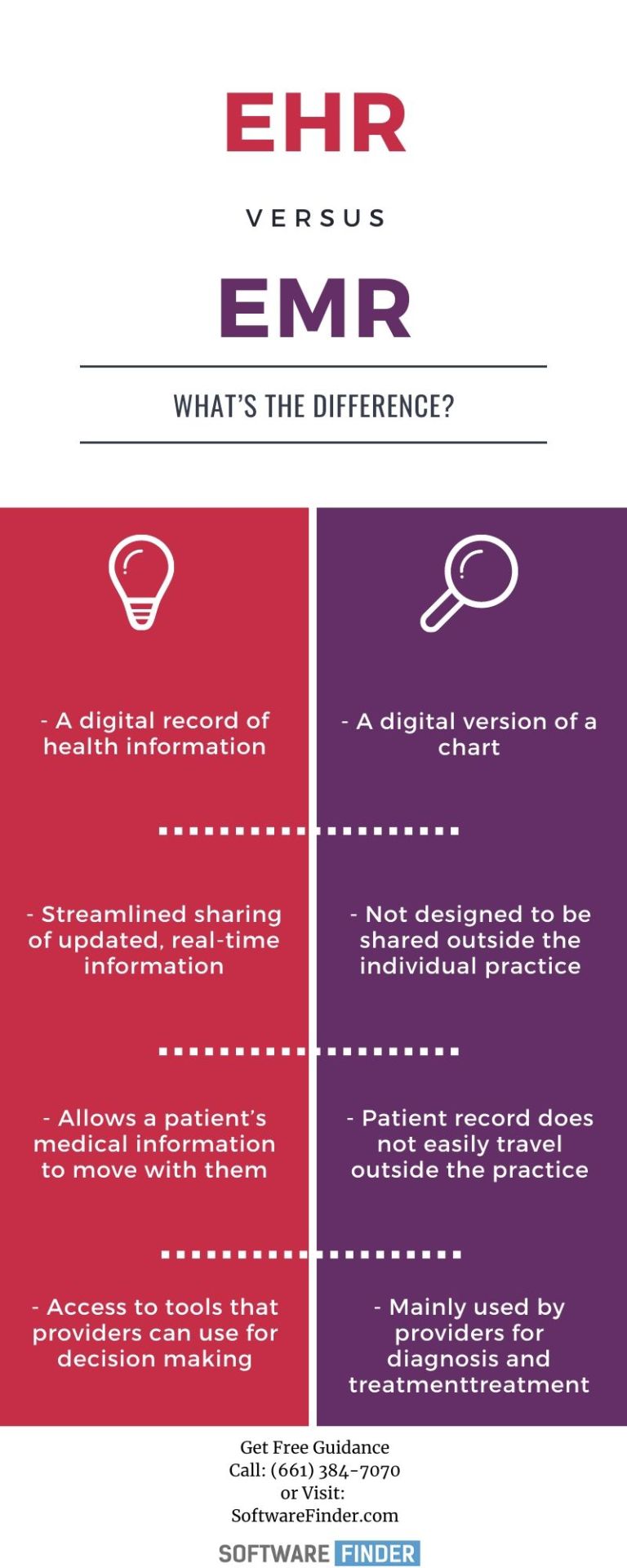
Difference About EHR vs EMR Software
Learn about the main differences between EHR and EMR software and find top EHR software and EMR software you can choose for your medical practice or hospital.
https://softwarefinder.com/electronic-health-records
0 notes